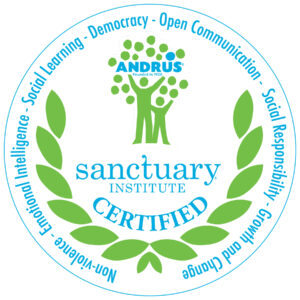The Sanctuary Model: Defining the Culture at Milestone
Milestone is a Sanctuary-certified agency. Milestone staff and persons supported are trained in the Sanctuary® Model – a guide for creating and sustaining a safe, democratic environment where healing occurs. The process teaches an understanding of trauma and how it affects individuals and organizations. According to the Sanctuary Model, it is the responsibility of caretakers to change their perspective on traumatized children and adults and to view them as hurt, rather than ill.
Milestone values the Sanctuary Model because our organization understands the connection among trauma, behavior and future healing. Sanctuary is proven to reduce physical aggression and promote a safe, non-violent atmosphere for everyone. Sanctuary is a cultural model rather than a treatment intervention and helps Milestone staff, persons supported and families to discuss behavior using a common language.
Sanctuary Terminology: S.E.L.F.
S.E.L.F. represents the four key areas of recovery that provide a framework for the complex problems presented by trauma survivors, by families with problems, and/or by chronically stressed organizations.
S – Safety: physical, emotional, social and moral safety; Safety is the foundation of healing and growth.
E – Emotions: how we learn to cope with strong emotions related to our experiences. We know that feelings drive behaviors and if we cannot effectively manage our feelings, we run the risk of acting them out in ways that are unproductive and self-defeating.
L – Loss: experienced universally, this refers to the physical loss of a person, an emotional loss such as a divorce or loss of hope or trust. We must recognize that all change involves loss and we cannot move onto healing if we do not acknowledge and deal with loss.
F – Future: embracing the belief that things can change and get better because we control our destiny and can create positive growth and change.
Sanctuary Terminology: The Seven Commitments
The Seven Sanctuary Commitments represent the guiding principles for implementation of the Sanctuary Model – the basic structural elements of the Sanctuary “operating system” – and each support trauma-related goals for clients and for staff:
- Commitment to Non-Violence: helping to build safety skills and a commitment to higher purpose.
- Commitment to Emotional Intelligence: helping to teach emotional management skills.
- Commitment to Social Learning: helping to build cognitive skills (memory, learning new information, speech, etc.).
- Commitment to Open Communication: helping to overcoming barriers to healthy communication, learn conflict management, reduce acting-out, enhance self-protective and self-correcting skills, teach healthy boundaries.
- Commitment to Democracy: helping to create civic skills of self-control, self-discipline, and administration of healthy authority.
- Commitment to Social Responsibility: helping to rebuild social connection skills, establish healthy attachment relationships, establish sense of fair play and justice.
- Commitment to Growth and Change: helping to work through loss and prepare for the future.
For organizational change to be effective, the Sanctuary Commitments must become internal commitments for all Milestone staff, those we serve and the organization as a whole. Our Sanctuary journey never ends – rather, it is an ongoing guide in how we conduct ourselves (as individuals and an organization) now and into the future.

